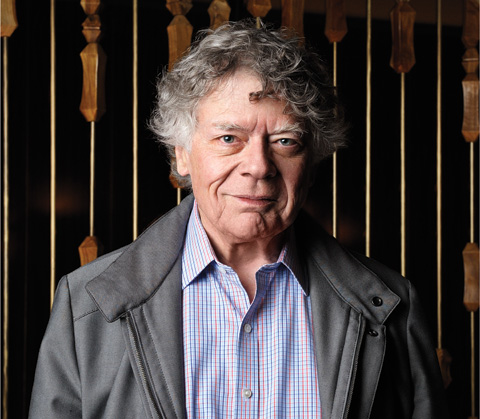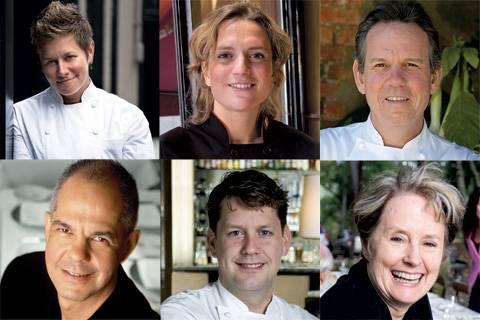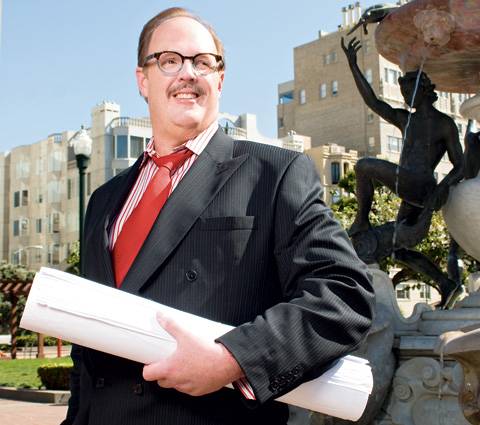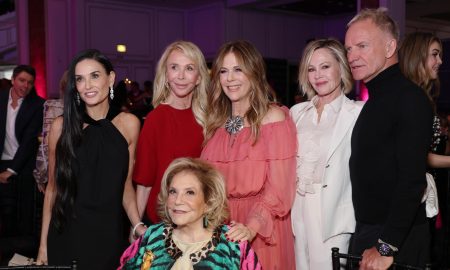
Interview by Seth Semilof
Photography by Steven b. Ekerovich at Royalton Hotel
Photo Editing by Shin Ono at Pier 59 Digital Art
Across the country, the Getty name is a familiar one. There’s Getty Images, Getty Museum, Getty Villa, Getty Conservation Institute, Getty Foundation, Getty Research Institute, and more. The family’s vast wealth comes from oil, and the late patriarch, J. Paul Getty, was, for decades, considered the wealthiest man alive-compare him to the modern-day Bill Gates, albeit with a more modest dollar sum in the bank account than today’s computer wiz. Upon the passing of J. Paul Getty in 1976, the $2 billion fortune was transferred to his eldest son, Gordon, a San Franciscan with an inherent love for music and an eye for lucrative business deals.
Getty Oil may no longer be running in black gold (Gordon sold the company in the mid-1980s to Texaco for $10 billion, doubling the assets in the Getty Trust), but the family name is still as strong as it was when Getty was the go-to gas station from coast to coast. After the sale, Gordon split the Getty Trust into four portions for his immediate family members, keeping a quarter for himself.
“We are trying to make the best goddamned wine in the world. And with all respect to our magnificent competition, we feel we are in the game.”
While he certainly used those funds to indulge his passion for music, composing waltzes, chamber works, and operas, Gordon also has an natural business acumen, which, when combined with the means, allowed him to create an empire that spans both characterizations and industries. It has been reported that business is mainly a diversion for the Forbes 400 member, but not so frivolous of a pastime to keep him from turning a revelation he had while on safari in Africa into a successful San Francisco-based company called ReFlow Management Co., which provides mutual funds with alternative sources of liquidity. He has written papers on mutual funds that attracted the attention of Nobel laureates, and is also self-taught in the language of Java and Mathematica. He has an innate ability to conjure up the answer to virtually any problem that faces him.
The broad range of Gordon’s ventures could be attributed to his longtime friendship with William Newsom, the father of San Francisco Mayor Gavin Newsom. “Bill Newsom was a high school chum from Saint Ignatius,” Gordon explains. “Bill was-and is-a gregarious guy with lots and lots of friends; people gravitate to Bill. He and I were close friends all our lives, so his family became sort of my surrogate family-his father, mother, and siblings. Their house was my home away from home.”
This close relationship has thrived over the years, and Gordon selected William to manage the Gordon P. Getty Family Trust, which reportedly earns Gordon tens of millions of dollars per year. During the long course of this friendship, Gordon watched William’s son, Gavin, blossom from a boy into a prolific businessman with the golden touch.
“Gavin was buying a few things,” Gordon explains. “But the fact is that he made money on everything he touched.”
When Gordon found himself losing money on an investment involving the former Villa Mt. Eden Winery, which was being run by a syndicate that included Gavin’s brother, Rick Newsom, Gordon knew whom to hand the reigns over to. “There came a time when I had to walk away from it, or I would have had to put in another half-million….I bought out everyone else’s increases, I think at 10 times what they paid, but nothing for their sweat, blood, and tears. And then I brought in Gavin.”
Gavin had previously founded PlumpJack Group, a “lifestyle business” that launched with a wine shop in the historic Cow Hollow district of San Francisco. Thanks to Gordon’s funding, PlumpJack expanded to include restaurants (Balboa Café on Filmore Street) and hotels (Squaw Valley Inn on Lake Tahoe), but the Villa Mt. Eden property, which was quickly renamed PlumpJack, represented the group’s first winemaking experience.
The wine brand exploded onto the scene in the mid-90s with PlumpJack’s inaugural release of the 1995 Reserve Cabernet Sauvignon, which received a score of 95+ points by leading wine critic Robert Parker Jr. Further cementing the company’s role as an industry innovator, they opted to bottle the $200 1997 Reserve with a screw-cap closure, becoming the first luxury wine producer to do so.
It wasn’t long before demand for PlumpJack wines began to catch up with the supply the land could naturally provide. “We got to a point in early 2001 where we were using all of the fruit from the PlumpJack estate,” explains John Conover, general manager of PlumpJack and a partner of the group’s latest venture, CADE Winery. “We had 50 acres in Oakville, and we were as large as we could be.” He began searching for other parcels within Napa Valley that were cabernet-based, and found a pristine property on Howell Mountain in Angwin, only 12 miles from the PlumpJack site, but a world away when it comes to the terroir.
“Terroir is a French word that doesn’t translate well,” Conover explains. “It is how the [grape] plant interplays with the climate, the soil, and the location. We are firm believers in terroir, and the wines made in PlumpJack’s Oakville estate are distinctive to that place.” Winemaker Anthony Biagi and Conover approached Gordon and asked if he would be interested in putting together a partnership to develop a new wine estate. The decision was made to create a separate identity to that of PlumpJack, in short because the wine would be different, but it would still operate under the brand’s umbrella.
“There is also a marketing side to this,” Gordon explains. “If you are selling underwear or tires, you want name brand recognition, but with wine it’s different. There is more of a boutique mentality.”
The group owns CADE Winery outright, as opposed to PlumpJack Winery, where they have picking rights on the land, a lease on the winery that they built, and, most importantly, quality control. “At CADE, it’s our property,” Gordon says with a sense of pride.
And prideful he should be. As he points out, California wines are becoming a major player on a global scale, competing with the world’s finest. “We are trying to make the best goddamned wine in the world. And with all respect to our magnificent competition, we feel we are in the game.”
It’s a modest assessment; in many ways, the state-of-the-art CADE is ahead of the game. CADE is the greenest winery and vineyard in the State of California. It is organically farmed, green-leaf certified, and is tracking to be Gold-LEED certified, thanks to its use of solar power, 30-percent fly ash concrete, 98 percent recycled material steel, and Forest Stewardship Council-certified glass and wood. “We are just stewards of the land up here,” says Conover. “We need to protect it and treat it the way it should be treated.” The insulation is made from recycled jeans, and each parking space has an electrical plug so that the electrical cars of the future will have a place to recharge.
While it may have cost a little more to design the winery as a green facility, the team wholeheartedly believes in the cause. “We not only have to think about yesterday, but we have to think about today, tomorrow, and the future,” explains Conover.
The goal is to protect what is considered one of America’s finest treasures: Napa Valley. “It is really one of the jewels of this country,” says Gordon. “The wines that are produced here and the people that work here, from the guys in the vineyards to the winery owners-it really is a special area that we need to protect and cherish, and make sure it stays that way.”
Napa Valley is one of Gordon’s greatest loves, however, it can’t really compete with his passion for music, which he has felt since birth. “I think you are born that way; I think it’s genes. If you ask where my genes come from, my mother’s mother sang on Broadway, which is the nearest thing I can find to a music career in my background. But the genes are there somehow.”
The Ann and Gordon Getty Foundation gives generously to music programs (underwriting programs of the San Francisco Opera and the San Francisco Symphony) and Gordon is noted as one of the nation’s most generous philanthropists, although he says, “I think I love the opera and symphony just as much as if I did not give to it….You should give what you can to what you understand.”
And understand music he does. As a composer, Gordon has released four CDs with a fifth in the works, and his Opera, aptly titled Plump Jack, has been played around the world. It’s fitting that both the music and the wine created by Gordon in the Bay region have a global following, helping to further cement the lasting legacy of the Getty name.
























